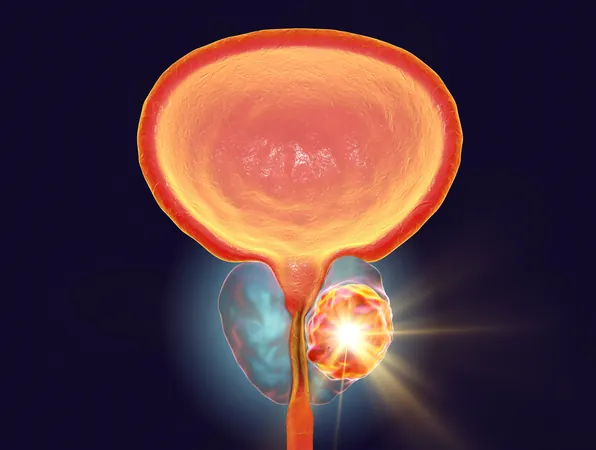
Promising Results in the Fight Against Rare Cancers: Pembrolizumab and Cisplatin Show Efficacy in Small Cell Bladder and Neuroendocrine Prostate Cancers
2024-11-18
Author: Rajesh
Introduction
In a groundbreaking phase 1b trial, researchers have unveiled promising results for the combination therapy of pembrolizumab (Keytruda) and cisplatin-based chemotherapy for patients suffering from small cell bladder cancer (SCBC) and neuroendocrine prostate cancer (NEPC). This innovative treatment could revolutionize the approach to these often-overlooked malignancies, offering hope for improved progression-free survival (PFS) and overall survival (OS) rates.
Study Overview
The study, published in *Cell Reports Medicine*, explored two distinct patient cohorts: one consisting of seven patients with metastatic or treatment-naive locally advanced SCBC, and another of eight patients diagnosed with NEPC. The results indicated an overall response rate (ORR) of an impressive 43%, showcasing potential across both cancer types.
Key Findings
Remarkably, the median follow-up period for PFS and OS was 34.2 months, with the 12-month PFS rates reaching 64% and 79% respectively across both cohorts. Furthermore, the 24-month PFS and OS rates displayed notable figures of 50% and 71%. This treatment regimen demonstrated particularly striking results in cohort 1, where 12-month PFS and OS rates soared to 86% each. Contrast this with cohort 2, where the 12-month PFS was significantly lower at 43%.
Safety Profile
One of the researchers commented on the safety profile of this combination therapy, stating, “This combination was safe and tolerable, with no patients delaying or discontinuing treatment due to toxicity.” This finding is crucial, given that both SCBC and NEPC are typically aggressive and hard to treat, underscoring the clinical potential of this therapeutic strategy.
Treatment Details
The study involved a total of 15 patients—7 in cohort 1 and 8 in cohort 2—who qualified for standard chemotherapy regimens. Notably, there were cases of exceptional responders, indicating that while the overall statistics are promising, individual responses to treatment can vary significantly.
In terms of treatment duration, the median course of pembrolizumab lasted for 31 cycles, with all patients successfully completing the maintenance therapy. Notably, patients in cohort 1 primarily received a combination of etoposide and cisplatin, while a mix of drug combinations was administered in cohort 2.
Adverse Events
While treatment side effects were monitored closely, the majority of adverse events were manageable. Fatigue topped the list of side effects, followed by skin issues, diarrhea, and peripheral neuropathy. No treatment-related fatalities were reported, reinforcing the safety of this regimen.
Future Directions
The trial also aimed to assess biomarkers that could predict patient responses to the therapy, suggesting that insights into the tumor microenvironment and immune responses will play a crucial role in personalizing treatments going forward.
Conclusion and Limitations
Despite these positive outcomes, the study acknowledges certain limitations, including the heterogeneous patient population that restricted the ability to evaluate responses by RECIST v1.1 criteria more rigorously.
These findings mark a significant step forward in the treatment landscape for SCBC and NEPC, potentially paving the way for more extensive studies and the eventual incorporation of these therapies into standard clinical practice. As the medical community keenly observes the ongoing developments, one thing remains clear: there is renewed hope for patients battling these challenging cancers. Stay tuned for more updates on this and other groundbreaking cancer research!

 Brasil (PT)
Brasil (PT)
 Canada (EN)
Canada (EN)
 Chile (ES)
Chile (ES)
 Česko (CS)
Česko (CS)
 대한민국 (KO)
대한민국 (KO)
 España (ES)
España (ES)
 France (FR)
France (FR)
 Hong Kong (EN)
Hong Kong (EN)
 Italia (IT)
Italia (IT)
 日本 (JA)
日本 (JA)
 Magyarország (HU)
Magyarország (HU)
 Norge (NO)
Norge (NO)
 Polska (PL)
Polska (PL)
 Schweiz (DE)
Schweiz (DE)
 Singapore (EN)
Singapore (EN)
 Sverige (SV)
Sverige (SV)
 Suomi (FI)
Suomi (FI)
 Türkiye (TR)
Türkiye (TR)
 الإمارات العربية المتحدة (AR)
الإمارات العربية المتحدة (AR)